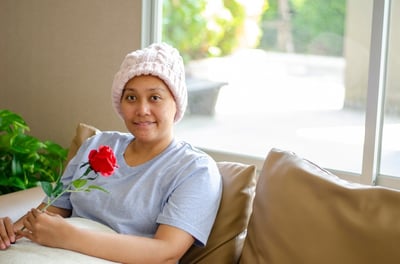FORCE's eXamining the Relevance of Articles for You (XRAY) program looks behind the headlines of cancer news to help you understand what the research means for you.
XRAY is a reliable source of hereditary cancer research-related news and information.
Learn more about the XRAY program
In portal: Breast Cancer, Categories Risk for Recurrence
Topic : Progress in the treatment of triple-negative breast cancer
Most relevant for: People with triple-negative breast cancer
During the December 2023 San Antonio Breast Cancer Symposium, Dr. Melinda Telli presented a summary of research that has led to better treatments for triple-negative breast cancer (TNBC). These treatments now include drugs called targeted therapies and immunotherapies for both early and late stages of TNBC. (Posted 3/19/24)
Read More
Update : A breast cancer vaccine for people with an inherited BRCA1, BRCA2 or PALB2 mutation
Most relevant for: People at increased risk for breast cancer undergoing prophylactic bilateral mastectomy due to an inherited mutation in BRCA1, BRCA2 or PALB2. People with TNBC who still have breast cancer after chemotherapy.
A breast cancer vaccine is showing promise in early clinical trials. Initially, the vaccine was tested in people with triple-negative breast cancer (TNBC) who were at high risk for recurrence. Now the vaccine is being tested to lower breast cancer risk among people with an inherited mutation in BRCA1, BRCA2 or PALB2. It is also being tested in people with triple-negative breast cancer who are at high risk for recurrence and are taking the immunotherapy drug Keytruda (pembrolizumab) after completing chemotherapy. (Posted 1/31/24)
Este artículo está disponible en español.
Read More
Study : Breast cancer disparities among the LGBTQ+ community
Most relevant for: People belonging to the LGBTQ+ community
This study looked at differences in breast cancer treatment outcomes among people from the LGBTQ+ community. (Posted 6/28/23)
Este artículo está disponible en español.
Read More
Relevance: High


Strength of Science: High


Study : Treatment to reduce bone fractures also improves breast cancer survival in postmenopausal people
Relevance: High


Strength of Science: High


Most relevant for: People with early-stage breast cancer who are post-menopausal
A large study looked at the effects of adding the bone-protective drug denosumab (Prolia), to standard hormone therapy for the treatment of early-stage, postmenopausal, HR-positive breast cancer. The researchers found that adding denosumab to aromatase inhibitor hormonal therapy improved bone health, disease-free survival and overall survival. (Posted 2/27/23)
Este artículo está disponible en español.
Read More
Update : Blood tests called liquid biopsies for cancer screening, monitoring and treatment
Most relevant for: People considering a liquid biopsy to screen for cancer
Could a simple blood test change cancer detection, treatment and monitoring? Several companies are offering a type of blood test known as a liquid biopsy to detect multiple cancers at their earliest stages, monitor response to treatment and help choose the best treatment. Although progress has been made using liquid biopsies to treat cancer, these tests have not yet been shown to detect cancer early enough to save lives. (posted 9/29/21)
Este artículo está disponible en español.
Read More
Relevance: Medium-High


Strength of Science: High


Research Timeline: Post Approval


Update : Pembrolizumab receives FDA approval for people with early-stage, triple-negative breast cancer
Relevance: Medium-High


Strength of Science: High


Research Timeline: Post Approval


Most relevant for: People with early-stage, triple-negative breast cancer who have a high risk for recurrence
The FDA approved the immunotherapy drug pembrolizumab (Keytruda) for the treatment of early-stage triple-negative breast cancer that has a high risk for recurrence. This marks the first approval for this type of drug, known as an immune checkpoint inhibitor, for the treatment of early-stage breast cancer. (posted 9/2/21)
Este artículo está disponible en español.
Read More
Relevance: High


Strength of Science: Medium-High


Research Timeline: Post Approval


Study : Drinking coffee or tea may improve survival after breast cancer
Relevance: High


Strength of Science: Medium-High


Research Timeline: Post Approval


Most relevant for: Women with breast cancer who drink coffee or tea.
In a study of 8,900 women with stage 1, 2 or 3 breast cancer, those who drank coffee survived longer after a breast cancer diagnosis than those who did not drink coffee. Both coffee and tea were linked to improved survival from any cause. Several factors were linked to greater coffee or tea consumption, so this finding must be taken with some caution. However, breast cancer survivors who are regular coffee or tea drinkers may find this research reassuring. (posted 8/31/21)
Este artículo está disponible en español.
Read More
Relevance: Medium-High


Strength of Science: High


Research Timeline: Post Approval


Guideline : ASCO guidelines recommend olaparib for people with early-stage, high-risk breast cancer and an inherited BRCA mutation
Relevance: Medium-High


Strength of Science: High


Research Timeline: Post Approval


Most relevant for: People with early-stage HER2-negative breast cancer and an inherited BRCA mutation
The American Society of Clinical Oncology (ASCO) has updated their breast cancer treatment guidelines to include treatment with the PARP inhibitor olaparib (Lynparza) for one year after completing chemotherapy, surgery and radiation (if used) to improve outcomes of people with an inherited mutation in BRCA1 or BRCA2 with early-stage, HER2-negative breast cancer who have a high risk for recurrence. (posted 8/6/21) Update: Based on results from the OlympiA Study, the FDA approved olaparib as adjuvant treatment for people with an inherited BRCA mutation who have been diagnosed with early-stage HER2-negative breast cancer and are at high risk for recurrence. (03/11/2022)
Este artículo está disponible en español.
Read More
Relevance: Medium-High


Strength of Science: High


Research Timeline: Post Approval


Study : Can tumor tests identify more breast cancer patients who can safely skip chemotherapy?
Relevance: Medium-High


Strength of Science: High


Research Timeline: Post Approval


Most relevant for: Women with breast cancer
Two studies presented at the December 2020 San Antonio Breast Cancer Symposium looked at how tumor testing can identify patients who may benefit the most and the least from chemotherapy. (3/4/21)
Este artículo está disponible en español.
Read More
Relevance: Medium-High


Strength of Science: Medium-High


Research Timeline: Post Approval


Study : How breast cancer patients experience hormone therapy
Relevance: Medium-High


Strength of Science: Medium-High


Research Timeline: Post Approval


Most relevant for: Breast cancer patients taking or considering taking hormone therapy
Side effects from hormone therapy are a common reason that many men and women with hormone receptor-positive breast cancer stop treatment early. Some people never start hormone therapy. This study asked patients about their experiences with hormone (or endocrine) therapy. The results suggest that there may be ways to improve the number of patients who stick with therapy. Patients need better ways to manage hormone therapy-related side effects. (1/19/21)
Este artículo está disponible en español.
Read More